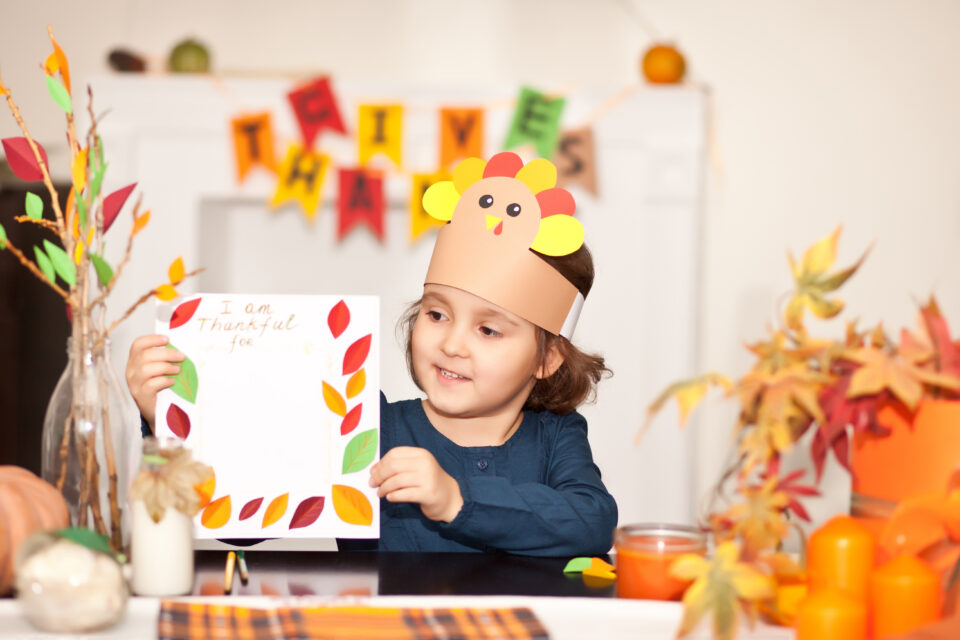The family is gathered around the Thanksgiving dinner table. You know the drill. It is time to go around the table and share what we are all grateful for, one by one! Looking around the table, everyone is on their best behavior and it is easy to be thankful for family. Realistically though, every day is not like Thanksgiving; sometimes kids lose sight of their gratitude and replace it with attitude. Luckily, with a little modeling and some hard work, gratitude can become a daily habit for kids (and their parents!).
Benefits of Gratitude
The turkey day exchange of, “What I’m grateful for….” produces a warm fuzzy feeling because expressing gratitude is a wonderful way to boost mental health. Good thoughts, such as gratitude, are contagious, one leads to another with a domino effect that can cause a complete shift in mindset. It is similar to when you buy a new car and all of the sudden see that type of car on the road everywhere—when you are grateful and positive, you see goodness everywhere. Making an effort to put a focus on expressing gratitude can be a catalyst to an overall good mood!
Beyond improving moods, gratitude and optimism are a dynamic duo that can even improve physical health. Negativity and stress go hand-in-hand with weakened immune systems and poor sleep. Continually getting bad sleep, feeling tired and sick can become cyclical and toxic. Take time to re-set your mindframe and start feeling better. Not only does a good thought turn into a good mood within an individual, being around someone with a positive outlook can be inspirational and motivational, too.
Parent Positively
Children are little sponges and they absorb quirks and mannerisms from the people they spend time with most, including their parents. Parents who simply say “please” and “thank you” on the regular are paving the way for their kids to do the same. A good example can be set when interacting with service people, friends and family, too. Kids listen when you use your words, so choose them wisely—be vocal and express your gratitude often!
Along with being grateful for those who are in our lives, it is important to express gratitude for what we have. If your kids are always saying their clothes and toys aren’t good enough, maybe do some reflection and ask where they may be getting that attitude. Is it a learned behavior? Voicing opinions on others’ bigger houses, nicer cars, and fancier trips does no good—it doesn’t make those houses any smaller, the cars less nice or the trips less fancy. Jealousy just leads to unhappiness within. Focus on enjoying what you have and the journey it took to get the life you have. Everyone works hard! We should all be proud of where we are right now. Wanting “more” is fine, but keep it within reason, set achievable goals to get there and focus on being content with your present, too. Children look to their parents as role models, keep that green monster at bay and don’t focus on the material.
Take Note
A simple act of gratitude with a big impact is keeping track of things for which we are thankful. Whether keeping a family gratitude journal or slipping notes of gratitude into a jar, writing it down physically and holding onto those moments is a great way to really place importance on them. If there is ever a need for a poof of happiness within the family, open up the book or jar, give it a look and really reflect on the amazing people and moments in life.
Give Back
Another manifestation of gratitude is acting on it through volunteer work. Understanding that others are truly in need offers a unique perspective on life. For little ones, simply communicating about donating their old toys and outgrown clothes to those who need them can be meaningful. Children may enjoy hosting lemonade stands, with proceeds going to a charity of their choice. This gives them the opportunity to acknowledge a worthy cause and also empowers them to help. Walking door to door to collect canned goods is a great way to meet neighbors and do good! Finally, older children may genuinely enjoy volunteering their time and energy with their friends and family at local community events, charity fundraiser opportunities and more. Being on the receiving end of, “Thank you”, and having others show their gratitude is a huge self-esteem booster. Not only is giving back rewarding, it can be a lot of fun, too.
In a world that focuses on more, bigger, better, take time to acknowledge the now. Be content in the present as a parent and show you are thankful with your words and actions—your children will surely follow suit and have a little less attitude and a bit more gratitude.
Have a Happy Thanksgiving and best of luck
keeping the gratitude gravy train going!
Keep the good feelings going by reading November Feedback, here.





